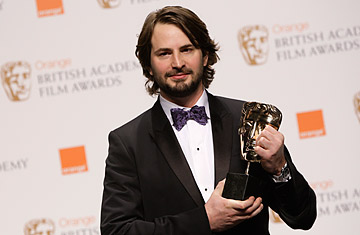
Screenwriter Mark Boal poses in the media room of the British Academy Film Awards 2010 at the Royal Opera House in London
Journalist Mark Boal, 37, struck Oscar-nomination gold with his screenplay for The Hurt Locker; as one of the film's producers, he's up for Best Picture too. Boal spoke with TIME's Radhika Jones in Los Angeles about the genesis of his script, the meaning of the phrase the hurt locker and why it's good to kill off famous people in your movie.
TIME: What was the origin of The Hurt Locker?
Mark Boal: I wanted to do a story that explained why the war was not going well and that showed the logistical futility of the war. So in 2004 I pitched a story to my editors at Playboy to do a piece on the bomb squad, and found myself in Baghdad eight months later. At some point while I was over there, it occurred to me that the insanity of the war was not being expressed in the popular media and that it could make a really eye-opening, gut-wrenching movie about the horrors of war to see the war through the eyes of these guys with this gutsy job on the front lines.
Did you have models in mind or movies that you were working against?
A little bit of both. For me, movies like Platoon and Saving Private Ryan, Schindler's List and Apocalypse Now, were not just cinematic experiences but were informative in terms of creating a sense of what those wars were like. They served that function in the culture. I was aiming for something along those lines with The Hurt Locker — to make a movie that hopefully, 20 years later, somebody would watch and say, Oh, I didn't know the war was like that.
But in terms of storytelling, I wanted to go in a different direction. The challenge is, how do you take some of the themes of the traditional war movie, which are kind of immutable — war is hell, the brutalizing aspects of combat — and do it in a contemporary way that reflects the reality of this war, in its tactical reality and also in the psychological reality of it being a volunteer army? Which is something that none of those wars had, so none of those movies dealt with it. To me, those were the two burdens: it had to get to something about the psychology of people who choose to fight, because that's what these guys are — volunteers — and something about the nature of war being a war of bombs as opposed to armies massing on two sides of a hill and fighting over terrain, which is what those other wars were about.
Did you have the title in your head the whole time?
Pretty early on. It's something I heard in Baghdad a couple of times, and it stuck with me, that phrase, the hurt locker. It means the place of ultimate pain — a painful place.
What stands out about your time on set?
What I remember of it most was the overwhelming pleasure and sense of satisfaction seeing the actors perform the characters that I had invented. That was an incredible thrill, unequaled by anything I'd ever done as a writer. Your work is being performed by these incredibly talented people. And it gives it this resonance that is deeper than it had for you when you were writing it, because now it's brought to life.
Tell me about the part you wrote for Ralph Fiennes.
It was a late addition to what was basically the final draft, because we needed him to trigger the financing because of his stature and name recognition. I wrote a part where he plays a diplomat, and he hated it and told me as much, in a very nice way — that there was no way he was going to do that part. The film literally stopped being feasible at that moment. He liked the rest of the movie, but that didn't do me any good, because he wasn't going to be in the rest of the movie. So I ended up rewriting a scene — modifying an existing scene to have these mercenaries in it. That's how the desert scene came to be.
The Guy Pearce scene was there from the beginning. That was actually always designed to be cast by a name. This is not a technique that we invented — Hitchcock is famous for it, in Psycho — but that was always the plan. You kill the famous person and it's very destabilizing. You think the movie is about the first person you see, and then they die, and 10 minutes in, you have the same sense of unpredictability that the other soldiers have. You identify with them, but you're not really sure who's the most valuable to the story, because the story has just inverted the normal valuing system of famous-means-they-live.
Did you have any sense of what was going to happen to this movie?
I thought it was going to be released in France and Bangladesh. That was my sense of it. I was keeping my fingers crossed and hoping we would find a U.S. distributor, and we did. But if you're asking me if I predicting nine Academy Award nominations — I didn't predict it.
